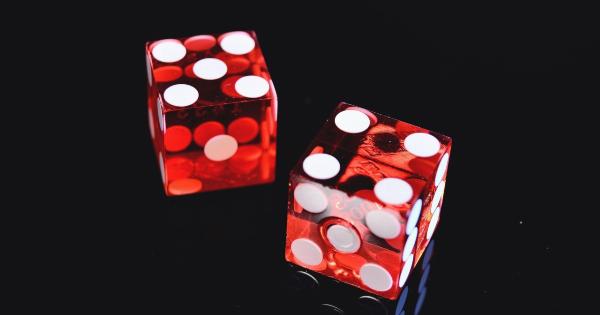Gambling can be an exciting and entertaining activity for many people. Whether it’s visiting a casino, purchasing lottery tickets, or participating in online gambling, the thrill of taking risks and the possibility of winning can be tantalizing.
However, for some individuals, gambling can become a dangerous addiction that takes a toll on their financial, emotional, and psychological well-being. In this article, we will explore the dangers of gambling addiction and provide insights on how to detect it.
What is Gambling Addiction?
Gambling addiction, also known as compulsive gambling or gambling disorder, is an impulse-control disorder in which an individual cannot resist the urge to gamble, despite the negative consequences it may have on their life.
Just like other types of addiction, gambling addiction involves a persistent and obsessive preoccupation with gambling, leading to negative financial, personal, and social outcomes. It is characterized by an inability to stop or control gambling habits, even when faced with adverse effects.
Signs and Symptoms
Recognizing the signs and symptoms of gambling addiction is crucial in identifying the problem early on. Here are some common indicators to watch out for:.
1. Increasing Preoccupation with Gambling
Individuals suffering from gambling addiction often experience an intense preoccupation with gambling. They may constantly think about their next opportunity to gamble, plan gambling activities, or reminisce about previous gambling experiences.
2. Loss of Control
One of the main characteristics of gambling addiction is the inability to control one’s gambling behavior. Individuals find it challenging to set and stick to limits or stop gambling altogether, despite wanting to do so.
They may also exceed their predetermined budget and continue gambling even when all funds have been depleted.
3. Neglecting Responsibilities and Relationships
Compulsive gamblers often prioritize their gambling activities over their responsibilities and relationships. They may neglect their work, studies, family obligations, and social interactions due to their preoccupation with gambling.
4. Financial Problems
A significant consequence of gambling addiction is financial distress. Individuals may find themselves borrowing money, stealing, or resorting to other illegal activities to fund their gambling habit.
They may accumulate debts, face bankruptcy, or experience severe financial consequences that affect their overall financial stability and future.
5. Emotional and Psychological Distress
Gambling addiction can lead to emotional and psychological distress. Individuals may experience anxiety, depression, guilt, shame, and irritability due to their inability to control their gambling habits and the adverse consequences it brings.
Additionally, gambling addiction often coexists with other mental health disorders such as substance abuse and mood disorders.
6. Chasing Losses
Compulsive gamblers frequently engage in “chasing losses,” meaning they strive to recover their losses by placing more bets.
Instead of accepting their losses, they believe that further gambling will help them regain their money, which often leads to even greater financial and emotional distress.
7. Hiding or Lying About Gambling
Individuals with a gambling addiction often attempt to hide or lie about their gambling habits. They may lie to their loved ones, friends, or colleagues about the extent of their gambling activities and the amount of money they spend on gambling.
8. Escaping Through Gambling
For some individuals, gambling becomes an escape from daily stressors and problems.
They turn to gambling as a means to cope with emotional pain, boredom, or loneliness, using it as a mechanism to temporarily avoid or numb their negative emotions and realities.
9. Failed Attempts to Stop Gambling
People with gambling addiction may make various attempts to stop gambling or reduce their gambling activities but repeatedly fail.
They may have a genuine desire to quit, yet find themselves continuously drawn back to gambling due to the powerful nature of their addiction.
10. Withdrawal Symptoms
Withdrawal symptoms can occur when an individual with gambling addiction attempts to stop or reduce their gambling activities. These symptoms may manifest as restlessness, irritability, anxiety, and even physical discomfort.
How to Detect Gambling Addiction
Identifying gambling addiction in oneself or a loved one can be challenging. However, the following steps can help in detecting and addressing the problem:.
1. Self-Assessment
If you suspect you might have a gambling addiction, start by honestly assessing your gambling habits and behaviors. Reflect on whether you experience any of the signs and symptoms discussed above.
Be open and honest with yourself about your gambling patterns and their impact on your life.
2. Seek Professional Help
If you believe you or someone you know has a gambling addiction, reach out to a mental health professional with experience in addiction. They can provide a comprehensive assessment and help develop an individualized treatment plan.
3. Support Groups
Joining a support group or attending therapy sessions specifically designed for gambling addiction can be immensely beneficial. Engaging with others who share similar experiences can provide valuable support, insight, and coping strategies.
4. Financial Management
Reestablishing financial stability is vital for individuals struggling with gambling addiction. Seek assistance from financial professionals who can help develop a realistic budget, manage debt, and provide guidance on overcoming financial challenges.
5. Limit Access to Gambling Opportunities
Removing or limiting access to gambling opportunities can be a crucial step in curbing the addiction.
Self-exclusion programs, such as voluntary bans and restrictions from casinos and online gambling platforms, can help individuals stay away from tempting environments.
6. Healthy Coping Mechanisms
Replace gambling with healthy coping mechanisms to deal with stress, boredom, or negative emotions. Engage in activities like exercise, hobbies, and socializing to fill the void left by gambling.
7. Open Communication
If you suspect a loved one may be struggling with gambling addiction, approach them with empathy and understanding. Encourage them to seek professional help and offer your support throughout their recovery journey.
Conclusion
Gambling addiction is a serious and destructive condition that affects individuals, families, and communities. Recognizing the signs and symptoms of gambling addiction is the first step in helping oneself or others who may be afflicted.
By seeking professional help, attending support groups, and implementing healthy coping mechanisms, individuals can regain control over their lives and overcome the dangers of gambling addiction.






















